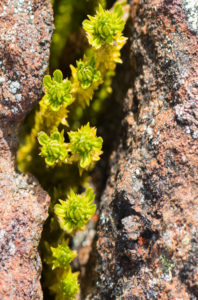Many herbal options have been studied for the purpose of relieving menopause symptoms. Black cohosh has been studied the most. This current study evaluates the effectiveness of a combination of black cohosh and rhodiola, compared with black cohosh alone to relieve menopause symptoms. Numerous symptoms are possible with perimenopause and/or menopause. These include hot flashes/night sweats, mood changes such as depression/anxiety/irritability/overwhelm and urogenital/sexual symptoms such as vaginal dryness/decline of libido and/or arousal. This is the short but common list.
Black cohosh is native to North America and was used by indigenous women for gynecological conditions, general health conditions and menopausal symptoms. There are many preparations including a standard tincture made from macerated fresh rhizomes in 50% alcohol for 10 days, simple dried rhizome in a capsule or the most modern, a standardized extract typically dosed at 40 mg/day. It is unknown what the comparative dose is between these three different methods, but the standardized extract is the most researched.
Adaptogenic herbs are very well known for a broad range of use including increasing stamina, response to stress and resilience. Familiar to many, rhodiola is amongst my favorites due to its broad action on multiple organ systems and thus multiple indications and uses. In non-menopausal women, rhodiola has research documentation and indications for depression, irritability, improved memory and improved mental and physical performance.
to stress and resilience. Familiar to many, rhodiola is amongst my favorites due to its broad action on multiple organ systems and thus multiple indications and uses. In non-menopausal women, rhodiola has research documentation and indications for depression, irritability, improved memory and improved mental and physical performance.
The researchers of this study logically hypothesized that a product combining both rhodiola and black cohosh might be more effective than black cohosh alone for menopausal symptoms. The researchers also sought to explore optimal dosing options.
This randomized clinical trial ended up having 220 women who met the entrance criteria. At their baseline visit, they had moderate scores on the Kupperman Menopausal Index (KMI), Menopause Relief Scale (MRS), and Utian Quality of Life (UQoL) index.
Women were randomized to receive rhodiola 400 mg/d plus black cohosh extract 13 mg/d or black cohosh extract alone 13 mg/d or black cohosh powdered root alone 1000 mg/d or placebo.
At both six and 12 weeks, there were significant decreases in KMI scores in all groups. The strongest effect was for the combination rhodiola-black cohosh where KMI mean scores fell by 71.2% from baseline. For the low dose extract and high dose of black cohosh powdered root and the placebo groups scores decreased by 50.5, 59.1, and 26.3%, respectively. As you can see, all the herbal groups were significantly greater than for the placebo group, but the effects of the herbal combination were significantly greater than for black cohosh alone, and this only improved over time. Similarly, MRS scores significantly decreased in all groups at both six and 12 weeks vs. baseline and the strongest effects were seen for the rhodiola-black cohosh combination with scores reduced by 67.7%. For the low dose extract and high dose black cohosh powdered root and the placebo, scores fell by 49.9, 60.0, and 26.9%, respectively and again, all treatment groups were significantly better than placebo and again over time, all groups were superior to placebo. In the analysis of those who stuck strictly to the study protocol, there was no significant difference in effect size between the combination or between the two black cohosh doses.
In the area of Utian Quality of Life Index, the most significant improvements were seen in the combination product and the higher dose black cohosh alone product but the strongest effect was for the combination at 25% higher scores vs. 17% for the doses of black cohosh and 12.2% for placebo. Again, this improvement in effect differences were greater over time. Over time, effects of RR-BC were superior to both doses of black cohosh particularly at 12 weeks.
While these results overall, suggest the superiority of rhodiola-black cohosh combination in the areas of the Utian quality of life scores in particular , it would have been ideal to include a rhodiola only treatment group. I often do add rhodiola as an adaptogen to a hot flash herbal selection such as black cohosh, especially when women have described fatigue, overwhelm, depression and/or memory changes. This study supports that habit.
Reference: Pkhaladze L, Davidova N, Khomasuridze A, Shengelia R, Panossian AG. Actaea racemosa L. is more effective in combination with Rhodiola rosea L. for relief of menopausal symptoms: a randomized, double-blind, placebo-controlled study. Pharmaceuticals. May 20, 2020;13(5):102.

